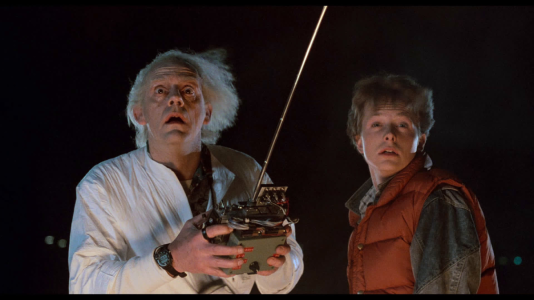Scientists confirmed time travel is real—here’s what that actually means for you.
By
Maan
- Replies 1
The concept of time travel has long captured the imagination, inspiring everything from classic literature to Hollywood blockbusters.
But what if it wasn’t just the stuff of fiction?
Scientists have spent decades exploring the nature of time itself, and their discoveries challenge everything we think we know about how it works.
The idea of time travel had long fascinated scientists and storytellers alike, with works like The Time Machine and Interstellar fuelling curiosity about whether it could ever become reality.
While many dismissed it as mere science fiction, physicists believed time travel was not only possible but had already happened.
According to experts, the reality of time travel was vastly different from the dramatic depictions seen in films.
On Earth, time moved at a constant rate of one second per second, but Einstein’s theory of general relativity suggested this could be altered.
By increasing speed, a person could move forward in time faster than those who remained stationary.
This effect, while nearly imperceptible at low speeds, became significant as an object approached the speed of light.
Astronauts aboard the International Space Station (ISS) experienced this phenomenon, making them real-life time travellers.
NASA explained that time travel involved moving through time at a rate faster than one second per second.
In Interstellar, this was achieved by approaching a black hole, but in reality, even boarding a plane could have a similar, albeit minimal, effect.
Einstein’s theory of relativity demonstrated that time was not an absolute constant but a flexible dimension influenced by speed and gravity.
In The Terminator, time travellers leapt into the past, but physicists argued that real time travel only worked in one direction—forward.
Dr Alasdair Richmond, a time travel expert from the University of Edinburgh, stated: ‘Einstein teaches us that how fast time passes in your surroundings varies with your velocity.’
This meant that someone travelling at high speed would experience time more slowly than someone standing still.
A 1971 experiment by Joseph Hafele and Richard Keating tested this principle using atomic clocks flown around the world on commercial aircraft.
One clock travelled eastward with the Earth’s rotation, moving faster relative to a stationary observer, while the other travelled westward, moving slower.
Upon their return, the eastward clock had lost 59 nanoseconds, while the westward clock had gained 237 nanoseconds, precisely as Einstein’s theory predicted.
This experiment confirmed that movement influenced the passage of time, making everyone who travelled at high speeds a time traveller to some extent.
Astronauts aboard the ISS, moving at 28,100 km/h, experienced this effect more dramatically than those on Earth.
NASA astronaut Scott Kelly, after spending 520 days in space, had aged slightly slower than his twin brother Mark Kelly, who remained on Earth.
Mark stated: ‘So, where I used to be just 6 minutes older, now I am 6 minutes and 5 milliseconds older.’
These minute differences mattered in precision technologies like GPS satellites, which moved at such high speeds that their clocks had to be adjusted to compensate for time dilation.
Without these corrections, GPS systems would be inaccurate and unreliable for navigation.
While forward time travel was a proven concept, travelling to the past remained a theoretical challenge.
Dr Richmond explained: ‘Backward time travel is much, much trickier.’
Theoretically, bending spacetime could create a shortcut known as a wormhole, potentially allowing for backward movement in time.
Professor Peter Watson from Carleton University stated: ‘You can bend space-time with mass: in fact, that is what gravity is in Einstein’s formulation.’
However, maintaining a wormhole required negative mass, which remained hypothetical and had never been observed in nature.
Even if a time machine using a wormhole were created, it would not allow travel to the past beyond the moment of its creation.
Dr Richmond noted: ‘If build the world’s first closed timelike curve generator tomorrow afternoon, I couldn’t use it to travel to any time before tomorrow afternoon.’
While Back to the Future portrayed time travel as a thrilling adventure, physicists believed that visiting the past like Marty McFly would likely remain impossible.

Time travel had long been a fascinating concept, but the reality was far more complex than science fiction suggested.
If forward time travel was already possible, what do you think the future holds for humanity’s understanding of time?
Let us know your thoughts in the comments.
But what if it wasn’t just the stuff of fiction?
Scientists have spent decades exploring the nature of time itself, and their discoveries challenge everything we think we know about how it works.
The idea of time travel had long fascinated scientists and storytellers alike, with works like The Time Machine and Interstellar fuelling curiosity about whether it could ever become reality.
While many dismissed it as mere science fiction, physicists believed time travel was not only possible but had already happened.
According to experts, the reality of time travel was vastly different from the dramatic depictions seen in films.
On Earth, time moved at a constant rate of one second per second, but Einstein’s theory of general relativity suggested this could be altered.
By increasing speed, a person could move forward in time faster than those who remained stationary.
This effect, while nearly imperceptible at low speeds, became significant as an object approached the speed of light.
Astronauts aboard the International Space Station (ISS) experienced this phenomenon, making them real-life time travellers.
NASA explained that time travel involved moving through time at a rate faster than one second per second.
In Interstellar, this was achieved by approaching a black hole, but in reality, even boarding a plane could have a similar, albeit minimal, effect.
Einstein’s theory of relativity demonstrated that time was not an absolute constant but a flexible dimension influenced by speed and gravity.
In The Terminator, time travellers leapt into the past, but physicists argued that real time travel only worked in one direction—forward.
Dr Alasdair Richmond, a time travel expert from the University of Edinburgh, stated: ‘Einstein teaches us that how fast time passes in your surroundings varies with your velocity.’
This meant that someone travelling at high speed would experience time more slowly than someone standing still.
A 1971 experiment by Joseph Hafele and Richard Keating tested this principle using atomic clocks flown around the world on commercial aircraft.
One clock travelled eastward with the Earth’s rotation, moving faster relative to a stationary observer, while the other travelled westward, moving slower.
Upon their return, the eastward clock had lost 59 nanoseconds, while the westward clock had gained 237 nanoseconds, precisely as Einstein’s theory predicted.
This experiment confirmed that movement influenced the passage of time, making everyone who travelled at high speeds a time traveller to some extent.
Astronauts aboard the ISS, moving at 28,100 km/h, experienced this effect more dramatically than those on Earth.
NASA astronaut Scott Kelly, after spending 520 days in space, had aged slightly slower than his twin brother Mark Kelly, who remained on Earth.
Mark stated: ‘So, where I used to be just 6 minutes older, now I am 6 minutes and 5 milliseconds older.’
These minute differences mattered in precision technologies like GPS satellites, which moved at such high speeds that their clocks had to be adjusted to compensate for time dilation.
Without these corrections, GPS systems would be inaccurate and unreliable for navigation.
While forward time travel was a proven concept, travelling to the past remained a theoretical challenge.
Dr Richmond explained: ‘Backward time travel is much, much trickier.’
Theoretically, bending spacetime could create a shortcut known as a wormhole, potentially allowing for backward movement in time.
Professor Peter Watson from Carleton University stated: ‘You can bend space-time with mass: in fact, that is what gravity is in Einstein’s formulation.’
However, maintaining a wormhole required negative mass, which remained hypothetical and had never been observed in nature.
Even if a time machine using a wormhole were created, it would not allow travel to the past beyond the moment of its creation.
Dr Richmond noted: ‘If build the world’s first closed timelike curve generator tomorrow afternoon, I couldn’t use it to travel to any time before tomorrow afternoon.’
While Back to the Future portrayed time travel as a thrilling adventure, physicists believed that visiting the past like Marty McFly would likely remain impossible.
Key Takeaways
- Time travel was possible according to Einstein’s theory of relativity, which showed time moved differently depending on speed and gravity.
- Experiments with atomic clocks and astronauts on the ISS confirmed that moving faster caused time to slow down, making them time travellers.
- Forward time travel was proven, but travelling to the past required a theoretical wormhole, which needed negative mass that had never been observed.
- Even if a time machine were built, it could only go back to the moment of its creation, making past travel like in Back to the Future impossible.
Time travel had long been a fascinating concept, but the reality was far more complex than science fiction suggested.
If forward time travel was already possible, what do you think the future holds for humanity’s understanding of time?
Let us know your thoughts in the comments.








